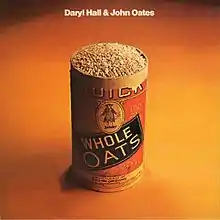Whole Oats
Whole Oats is the debut studio album by American pop music duo Hall & Oates. The album was released in September 1972, by Atlantic Records.
| Whole Oats | ||||
|---|---|---|---|---|
 | ||||
| Studio album by | ||||
| Released | September 1972 | |||
| Recorded | 1972 | |||
| Studio | Atlantic Recording Studios, New York City, U.S. | |||
| Genre | ||||
| Length | 38:08 | |||
| Label | Atlantic | |||
| Producer | Arif Mardin | |||
| Daryl Hall & John Oates chronology | ||||
| ||||
| Singles from Whole Oats | ||||
| ||||
| Review scores | |
|---|---|
| Source | Rating |
| AllMusic | |
The duo consisted of Daryl Hall and John Oates, both of Philadelphia. Prior to making this album, the duo made numerous demos, some of which were released on the Past Times Behind collection. It was released on CD for the second time on February 12, 2008 by American Beat Records, putting it back in print after the original Atlantic Records CD release went out of print. On February 24, 2017, Friday Music released a remastered version of the album along with their third studio album, War Babies.[2] The music on this record is a combination of soft rock, folk, and soul.
Track listing
| No. | Title | Writer(s) | Length |
|---|---|---|---|
| 1. | "I'm Sorry" | Daryl Hall, John Oates | 3:06 |
| 2. | "All Our Love" | Hall, Oates | 2:41 |
| 3. | "Georgie" | Hall | 2:42 |
| 4. | "Fall in Philadelphia" | Hall | 3:58 |
| 5. | "Waterwheel" | Hall | 3:52 |
| 6. | "Lazyman" | Hall | 3:15 |
| No. | Title | Writer(s) | Length |
|---|---|---|---|
| 7. | "Goodnight and Goodmorning" | Hall, Oates | 3:18 |
| 8. | "They Needed Each Other" | Hall | 3:59 |
| 9. | "Southeast City Window" | Oates | 2:31 |
| 10. | "Thank You For..." | Oates | 4:36 |
| 11. | "Lilly (Are You Happy)" | Hall, Oates | 4:10 |
Personnel
- Daryl Hall – vocals, keyboards, synthesizer, guitars, mandolin, vibraphone, arrangements, cello and arrangements on "Southeast City Window"
- John Oates – vocals, guitars, arrangements
- Jerry Ricks – guitar on "Southeast City Window"
- Bill Keith – pedal steel guitar on "All Our Love" and "Southeast City Window"
- Mike McCarthy – bass
- Jim Helmer – drums, percussion
- Arif Mardin – horn and string arrangements
Production
References
- Stephen Thomas Erlewine. "Whole Oats – Daryl Hall & John Oates". AllMusic. Retrieved August 29, 2018.
- "DARYL HALL & JOHN OATES | WHOLE OATS & WAR BABIES CD (Original Recording Masters/ Deluxe 2 CD Set/Limited Edition)". Friday Music. Retrieved February 22, 2017.
This article is issued from Wikipedia. The text is licensed under Creative Commons - Attribution - Sharealike. Additional terms may apply for the media files.